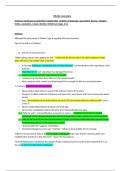Othello essay plans
Jealousy, Desdemona and Emilia’s relationship, varieties of language, masculinity, honour, imagery,
Emilia, reputation, Cassio, Identity, Othello and Iago, love
Jealousy
Although the plays name is Othello, Iago is arguably the main character
Iago as the driver of jealousy
1) Due to his own insecurity:
-When talking about Cassio getting the job, “ I know not if’t be true, but I, for mere suspicion in that
kind, will do as if for surety” (Act 1 scene 3)
In his long soliloquy's, establishes him as a key character, and foreshadows the importance of his
jealousy.
Repetition of “I”, self- absorbed, has damaged his honor.
Jealousy intertwined with male honour in society
Jealousy as a relentless force that can’t be reasoned with
Mere suspicion that a man has embarrassed him is enough for him to cause destruction.
-S. McAvoy: “Iago has no real intentions”
Agree: petty nature doesn’t warrant the extreme nature of his plans.
Disagree: multiple evidence of jealousy and insecurity, seen above and from his insecurity about
Emilia.
Iago, “And nothing can or shall content my soul/ Till I am evened with him, wife for wife” (Act 2
scene 1)
Shows relationship between jealousy and male ego
As he is the cuckolded husband character from Commedia Del Arte play.
“Wife for wife”: commodification, economic in nature--- would be acceptable for English
audiences as even though Venice was seen as a more liberal place, patriarchy was still present.
Links to the ideas of the structuralist theorist Claude Levi-Strauss who talks about women being
exchangeable objects in the patriarchal society.
“Evened with him” suggests competition
Somewhat dangerous as he says “nothing”- will go to great lengths for his revenge
-Fight for his own honor links to the Great Chain of Being, perhaps men feel the need to satisfy and
establish their positions in this hierarchy---reason for his jealousy.
-Overall Shakespeare establishes the danger of Iago’s jealousy early on to show how impactful he is on
the play’s plot, he is the driver of jealousy.
, 2) Iago's manipulation of language, causing Othello’s paranoia
-Othello is insistent on honesty, Iago continuously repeats “Honest?” after Othello in act three
And “Men should be what they seem”
Shakespear’s use of language is important
Othello believes Iago’s honesty is making him hide something out of loyalty, Iago uses his
honesty as a weapon, Othello believes Iago
Allows Iago to come across as an Elizabethan Machiavel
Moreover, Othello seems to further demonstrate Iago’s success through his own language
-Fintan O’Toole, “so close are Iago and Othello, indeed, that they start to melt into each other...
Othello’s grand verse breaks down into jagged prose. Iago’s prose becomes triumphant verse”
Agree: Iago has been successful: when D attempts to comfort Desdemona, “Let it alone. Come,
I'll go in with you”, this is indeed the “jagged” prose O’Toole mentions.
Iago sucessfully established as the Zanni, but arguably his is much more dangerous by the lesser
evil “trickster” role of a Zanni
Iago’s success and ingratiation plants fear into the contemporary audience, adhered to the
belief that the devil could walk among ordinary individuals, also was in line with the paranoia
present after the Gunpowder plot 1605 etc.
On the other hand arguably the transformation of Othello’s language is less like him ‘melting’
into Iago but simply a consequence of his inner turmoil
Othello, “Her name that was as fresh/ As Dian’s visage, is now begrim’d & black/ as mine own face”.
Use of chiascuro creates contrast between white and black
Uses his race as a reason for Desdemona’s alleged betrayal- internalized racism?
Iago causes Othello to become introspective (individuals in Jacobean England were encouraged
to be introspective and look at themselves from within and dwell on their conscience
Shows Iago’s success- paints him as a dangerous character and shows he is the clever servant
tricking his master from a Comedia Del Arte
Desdemona




